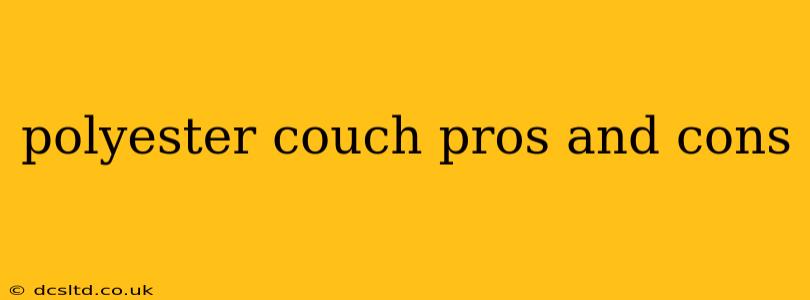Polyester fabric has become a popular choice for couches due to its affordability and versatility. However, like any material, it has its advantages and disadvantages. This guide will delve into the pros and cons of polyester couches, helping you make an informed decision for your home.
Pros of Polyester Couches
Polyester boasts several key benefits that make it a compelling option for upholstery:
1. Affordability: Polyester is a synthetic fiber, making it significantly cheaper to produce than natural fabrics like cotton or linen. This translates to lower prices for consumers, making it an accessible choice for budget-conscious shoppers. This makes it a particularly attractive option for those furnishing a first home or replacing worn furniture without breaking the bank.
2. Durability and Resilience: Polyester is known for its strength and resistance to wear and tear. It can withstand significant use, making it a suitable choice for households with children or pets. Its resilience to stretching and pilling means your couch will maintain its shape and appearance for longer, even with daily use.
3. Stain Resistance: Many polyester fabrics are treated with stain-resistant finishes, making them easier to clean and maintain. Spills and accidental marks can often be easily wiped away, minimizing the need for extensive cleaning. This is a huge advantage for busy families or those prone to accidental spills.
4. Water Resistance: Similar to stain resistance, many polyester fabrics also offer water resistance, preventing liquids from readily absorbing into the fabric. This helps protect the couch from water damage and makes cleaning up spills even simpler.
5. Variety of Textures and Styles: Polyester is highly versatile. It can be woven and treated to mimic the look and feel of other fabrics, from the plush softness of velvet to the crispness of linen. This allows for a wide range of design options and aesthetics to suit different interior styles.
6. Easy Care and Maintenance: Polyester is generally low-maintenance. It's typically easy to clean, either by spot cleaning or machine washing (depending on the specific fabric and manufacturer's instructions). This makes it a practical choice for busy lifestyles.
Cons of Polyester Couches
While polyester offers many advantages, it’s essential to consider its drawbacks:
1. Not as Breathable as Natural Fibers: Unlike natural fabrics, polyester doesn't breathe as well. This can lead to a warmer sitting experience, especially in warmer climates. This lack of breathability can also contribute to the buildup of moisture and potentially lead to the growth of mold or mildew if not properly ventilated.
2. Can Feel Less Luxurious: While advancements in manufacturing have improved the feel of polyester, it often lacks the luxurious softness and drape of natural fibers. Some people find it feels less comfortable or less aesthetically pleasing than other upholstery materials.
3. Potential for Pilling: Although generally durable, some polyester fabrics are prone to pilling—the formation of small balls of fiber on the surface. While this doesn't significantly affect the couch's functionality, it can detract from its appearance. However, high-quality polyester blends often mitigate this issue.
4. Can Be Susceptible to Static Cling: Polyester is a synthetic fiber, and thus can accumulate static electricity, particularly in dry environments. This can be annoying and may require the use of anti-static sprays.
5. May Not Be as Durable as High-End Materials: While generally durable, polyester may not match the longevity of high-end natural fiber couches. The lifespan of a polyester couch can vary significantly depending on the quality of the fabric and the construction of the piece.
6. Can Fade in Direct Sunlight: Prolonged exposure to direct sunlight can cause some polyester fabrics to fade, altering the color and appearance of your couch over time.
Is a Polyester Couch Right for You?
Ultimately, the decision of whether or not a polyester couch is right for you depends on your individual needs and priorities. Consider your budget, lifestyle, and aesthetic preferences. If you prioritize affordability, durability, and easy maintenance, a polyester couch could be an excellent choice. However, if you prioritize breathability, luxurious feel, and extreme longevity, you might want to explore other upholstery options. Weighing the pros and cons carefully will help you make the best decision for your home and your lifestyle.
Frequently Asked Questions (FAQ)
How long does a polyester couch last?
The lifespan of a polyester couch varies greatly depending on the quality of the fabric, the construction of the couch, and how often it is used. With proper care, a high-quality polyester couch can last for many years, potentially 5-10 years or more.
Can you wash a polyester couch cover?
Some polyester couch covers are machine washable, while others require spot cleaning or professional cleaning. Always check the manufacturer's care instructions before attempting to clean your couch cover.
Is polyester couch fabric good for pets?
Polyester is relatively durable and can withstand some wear and tear from pets. However, the stain resistance will vary depending on the specific fabric treatment. Choosing a dark color can help mask pet hair and stains.
This comprehensive guide offers a balanced perspective on the advantages and disadvantages of choosing a polyester couch. Remember to thoroughly research specific products and read reviews before making a purchase.
